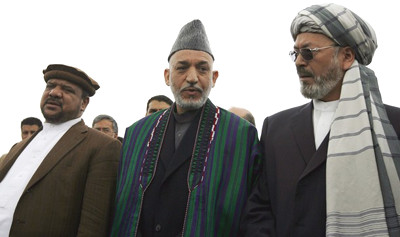KABUL - The U.N. mission head in Afghanistan begged President Hamid Karzai not to name as his running mate an ex-guerrilla chief linked to accusations of human rights abuses but was ignored, a diplomatic source close to him said on Monday.

RAWA: Hamid Karzai named Qasim Fahim (left) as first and Karim Khalili (right) as second vice president, both of them notorious warlords accused of war crimes, brutalities and corruption. (Photo: Reuters)
Human Rights Watch: "He [Fahim] is widely believed by many Afghans to be still involved in many illegal activities, including running armed militias, as well as giving cover to criminal gangs and drug traffickers."
Karzai registered to run for re-election on Monday and named former vice president and defence minister Mohammad Qasim Fahim to stand with him as the senior of two vice presidents.
The international diplomatic source said U.N. mission chief Kai Eide had repeatedly met Karzai in recent days to try to persuade him not to pick Fahim for the August 20 poll.
Eide was "saddened" and "disturbed" by Karzai's choice and believed the concern was widely shared by the international community of diplomats in Kabul, the source said.
"He's been one of the known warlords in this country and has a history of human rights violations that's serious," the source said.
Rights groups also expressed alarm. Brad Adams, Asia director of New York-based watchdog Human Rights Watch, said Karzai "is insulting the country with this choice." In a 2005 report, Human Rights Watch accused Fahim of abuses.
"To see Fahim back in the heart of government would be a terrible step backwards for Afghanistan," Adams said. "He is one of the most notorious warlords in the country, with the blood of many Afghans on his hands from the civil war."
"He is widely believed by many Afghans to be still involved in many illegal activities, including running armed militias, as well as giving cover to criminal gangs and drug traffickers."
Two secretaries to Fahim did not answer phone calls on Monday seeking comment.
The source close to Eide said the choice of Fahim -- announced hours before Karzai left for Washington for his first meeting with U.S. President Barack Obama since Obama took office -- could also hurt Karzai's relationship with Washington.
Obama administration officials have publicly criticised Karzai in the past for being too tolerant of corruption, although that criticism has become more muted recently.
ETHNIC BALANCE
Fahim was the military commander of the guerrilla forces that toppled the Taliban with U.S. help in 2001, paving the way for Karzai to become president.
He is a member of the Tajik community, Afghanistan's second-largest ethnic group. Karzai is a Pashtun from the largest group, so Fahim's presence helps balance out his ticket.
"Maybe he can bring votes. What else does he bring?" said the source, describing Eide's arguments to Karzai. "You're bringing back more of an old guard that we believed could gradually be phased out of the political landscape and be replaced by more modern people who can move the country forward."
Fahim served as defence minister and vice president after Karzai took power in 2001, but Karzai dropped him when he stood in the country's first democratic presidential election in 2004.
More recently, Fahim was a founding member of an opposition group. But last month he abruptly withdrew from the opposition, apparently to accept Karzai's offer of a place on his ticket.
Another international diplomatic source said the United Nations suspected Fahim had run networks of armed men in Kabul since 2001 responsible for weapons smuggling, narcotics trafficking, bank robberies and the kidnapping of foreigners.
Opponents of Karzai have had difficulty settling on a candidate with broad enough support to challenge the president in the August 20 poll. One of the main challengers, provincial governor Gul Agha Sherzai, pulled out of the race abruptly on Saturday, and other main rivals have yet to formally register.
(Editing by Paul Tait)



